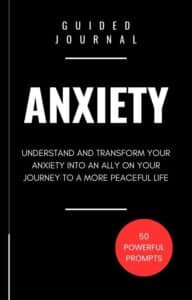In the labyrinth of life’s challenges, anxiety often emerges as a formidable adversary, casting shadows of doubt, fear, and uncertainty across our paths. Yet, within the confines of our own minds lies a powerful tool for illumination and navigation: journaling. Embarking on a journey through the written word, we uncover “50 Powerful Journal Prompts to Navigate Through Anxiety,” a beacon of hope designed to guide you through the tumultuous waters of your inner world. This collection is not merely a series of questions; it is a meticulously crafted voyage into the depths of your psyche, a chance to confront and coalesce with your anxieties in a space that is both safe and sacred.
Anxiety, in its myriad forms, affects each of us uniquely, weaving its narratives into the tapestry of our daily lives. It can be a whisper of hesitation, a roar of overwhelming dread, or a constant hum in the background of our existence. In recognizing this universal struggle, the prompts provided herein serve as keys to unlock the doors behind which our fears and hopes reside side by side. By engaging with these prompts, you embark on a quest for understanding, acceptance, and, ultimately, transformation. This journey is about more than just quelling the storms of anxiety; it’s about discovering the strength, resilience, and profound insights that lie within the tempest itself.
Understanding Anxiety
Anxiety is a term that has increasingly become a part of our everyday vernacular, often used to describe moments of worry, fear, or unease. However, the true depth of anxiety extends far beyond these fleeting feelings, manifesting itself as a complex and multifaceted emotion that can have profound impacts on an individual’s life. This guide aims to delve into the nuances of anxiety, providing a clearer understanding of what it is, how it manifests, and ways to manage it effectively.
What is Anxiety?
Anxiety is a natural human response to perceived threats or stressful situations. It serves as a psychological and physiological state that triggers the body’s fight-or-flight response, preparing an individual to confront or avoid danger. While anxiety is a normal and often healthy emotion, it becomes a concern when it is constant or overwhelming, interfering with daily activities.
The Different Forms of Anxiety
Anxiety can manifest in various forms, including but not limited to:
Generalized Anxiety Disorder (GAD): Characterized by persistent and excessive worry about various aspects of daily life, such as health, work, or relationships, even when there is little or no reason to worry.
Panic Disorder: Involves recurrent panic attacks that strike suddenly and without warning, accompanied by intense physical symptoms like chest pain, heart palpitations, dizziness, and shortness of breath.
Social Anxiety Disorder: The intense fear of being judged, negatively evaluated, or rejected in a social or performance situation.
Phobias: An irrational fear and avoidance of a specific object, situation, or activity that is generally not harmful.
Recognizing the Symptoms of Anxiety
Anxiety can affect individuals in different ways, but common symptoms include:
Emotional Symptoms: Feelings of dread, irritability, restlessness, and anticipation of the worst.
Physical Symptoms: Increased heart rate, sweating, trembling, fatigue, and gastrointestinal issues.
Cognitive Symptoms: Racing thoughts, unwanted or repetitive thoughts, and concentration difficulties.
Understanding the Causes of Anxiety
The origins of anxiety are diverse and can be attributed to a combination of genetic, environmental, psychological, and developmental factors. Life experiences such as traumatic events, early childhood adversity, and stress from personal relationships, work, or financial concerns can significantly contribute to the development of anxiety disorders. Additionally, medical factors, including the side effects of medication, symptoms of a different disease, or the stress of a significant diagnosis, can also trigger anxiety.
Coping Strategies and Management
Professional Help
Seeking professional help is a crucial step in managing anxiety effectively. Therapies such as Cognitive Behavioral Therapy (CBT) have been shown to be particularly effective in treating various forms of anxiety by helping individuals understand and change their thought patterns and behaviors.
Self-Help Strategies
Mindfulness and Relaxation Techniques: Practices such as meditation, deep breathing exercises, and yoga can help reduce the physical symptoms of anxiety by relaxing the body and focusing the mind.
Physical Activity: Regular exercise can help alleviate anxiety by releasing endorphins, natural brain chemicals that improve mood and act as natural painkillers.
Healthy Lifestyle Choices: Maintaining a balanced diet, getting enough sleep, and reducing caffeine and alcohol intake can also help manage anxiety symptoms.
Personal Connection and Understanding
It’s not uncommon to feel anxious before a job interview, on the first day of school, or when facing financial difficulties. These moments of anxiety are relatable for many and highlight the universality of this emotion. What distinguishes everyday anxiety from an anxiety disorder is the intensity and persistence of the feelings experienced and the impact they have on an individual’s ability to function in daily life.
In conclusion, while anxiety is a complex and challenging emotion, understanding its nuances is the first step towards managing it effectively. By recognizing the symptoms, understanding the causes, and exploring both professional and self-help strategies, individuals can navigate their way through the storms of anxiety towards a calmer, more manageable state of being. Remember, seeking help is a sign of strength, and with the right support and resources, it is possible to overcome the challenges posed by anxiety.

The Transformative Power of Journaling on Anxiety
In a world that moves at an ever-accelerating pace, finding solace and clarity amidst the chaos can be a daunting task. Anxiety, a frequent visitor in the minds of many, often compounds this challenge, weaving a complex web of worry and stress that can be difficult to untangle. However, there is a simple, yet profoundly effective tool at your disposal, capable of not only unraveling this web but also transforming it into a tapestry of insight and understanding. This tool is journaling.
What is Journaling?
Journaling is the practice of regularly writing down your thoughts, feelings, experiences, and reflections. It’s a personal process that provides a private space for self-expression without judgments or constraints. Unlike other forms of writing, journaling is not about grammar, punctuation, or style—it’s about honesty, exploration, and the raw expression of your inner world.
The Gateway to Self-Discovery
At its core, journaling is a gateway to deeper self-discovery. It allows you to converse with your inner self, to ask questions, and to listen to the answers that come from within. Through this dialogue, you can uncover underlying patterns of thought, behavior, and emotion that contribute to your anxiety, shedding light on aspects of your experience that may have previously been obscured.
The Benefits of Journaling for Anxiety
Journaling offers a multitude of benefits for those grappling with anxiety. By engaging in this practice, you can:
Facilitate Emotional Release
Writing about your anxieties and fears provides an outlet for emotional release. It’s a way to let go of pent-up emotions, to clear your mind, and to reduce the intensity of your feelings. This act of externalization can make your anxieties feel more manageable and less overwhelming.
Gain Perspective
Journaling helps you gain perspective on your worries. When you see your thoughts on paper, it becomes easier to distinguish between realistic concerns and unnecessary worries. This process can help you understand what is within your control and what is not, guiding you towards a more balanced and grounded outlook on life.
Enhance Self-awareness
Regular journaling encourages self-awareness by highlighting recurring themes, triggers, and patterns in your anxiety. This heightened awareness can empower you to identify and address the root causes of your stress, rather than merely coping with its symptoms.
Encourage Problem-solving
Journaling can transform passive worry into active problem-solving. By writing about your anxieties, you can begin to explore potential solutions, set realistic goals, and develop strategies to manage your stress. This shift from rumination to action can significantly reduce feelings of helplessness and despair.
Strengthen Emotional Resilience
Over time, journaling builds emotional resilience. It teaches you to confront and process your feelings, fostering a sense of inner strength and adaptability. This resilience can buffer you against future stressors, making you better equipped to handle the uncertainties of life.
How to Start Journaling for Anxiety
Embarking on your journaling journey is simple and requires no special tools or techniques—just a notebook, a pen, and an open mind. Here are some tips to get you started:
Set Aside Regular Time: Dedicate a few minutes each day to journaling. Consistency is key to reaping the benefits.
Create a Safe Space: Choose a quiet, comfortable spot where you can write without interruptions.
Be Honest and Unfiltered: Write freely and without self-censorship. Remember, this is your private space to express yourself.
Reflect on Your Writing: After journaling, take a moment to reflect on what you’ve written. Look for insights or recurring themes that may emerge.
In the journey through life, anxiety can be a challenging companion. Yet, through the practice of journaling, you have the power to transform this challenge into a catalyst for growth and self-discovery. By providing a space for emotional release, fostering self-awareness, and encouraging active problem-solving, journaling offers a pathway to not only manage anxiety but to thrive in spite of it. So, take up your pen and let the pages of your journal be the canvas upon which you paint a more serene, empowered, and enlightened version of yourself.

Journal Writing Prompts for Anxiety
- Describe a moment when you felt your anxiety peak. What triggered it, and how did you navigate through that experience?
- Reflect on a time when anxiety held you back from doing something you love. How can you overcome this barrier in the future?
- Write about the physical sensations of anxiety you experience. How does your body tell you that you’re anxious?
- Think about the relationship between your anxiety and your self-esteem. How does one affect the other, and what steps can you take to improve both?
- Consider the role of social media in your anxiety. Are there specific aspects that heighten your anxiety? How can you manage or mitigate this impact?
- Explore the concept of “anxiety triggers.” Identify yours and discuss strategies for managing or avoiding them.
- Anxiety often comes with negative self-talk. Write down some of these thoughts and counter them with positive affirmations.
- Discuss how anxiety has affected your relationships. What conversations could you have to improve understanding and support?
- Imagine your life without anxiety. What does it look like, and what steps can you take to move closer to this vision?
- Anxiety can sometimes be linked to a fear of the unknown. What uncertainties are currently on your mind, and how can you address them?
- Reflect on a past experience where you successfully managed your anxiety. What did you learn from that situation?
- Write about the role of exercise in managing your anxiety. Have you found a particular activity that helps? If not, what would you like to try?
- Consider the impact of diet on your anxiety levels. Are there foods or drinks that exacerbate your anxiety?
- Explore the connection between sleep and anxiety. How does one affect the other, and what changes could improve both?
- Anxiety can sometimes stem from a lack of boundary setting. Reflect on your boundaries and whether they need adjustment.
- Think about a hobby or activity that reduces your anxiety. Describe why it’s effective and how you can incorporate it more into your life.
- Journal about the role of mindfulness or meditation in your life. How could these practices help you manage anxiety?
- Write about a situation where you anticipated the worst outcome due to anxiety, but the reality was much different. What did you learn?
- Reflect on the support systems you have for managing anxiety. How can you strengthen these supports or find additional resources?
- Explore the idea of control and anxiety. What aspects of your life do you feel you need more control over, and why?
- Write about the biggest misconception others have about your anxiety. How can you educate them?
- Consider the role of professional help in managing anxiety. What steps can you take to seek support if needed?
- Anxiety can affect decision-making. Reflect on a decision you struggled with recently due to anxiety.
- Write about the link between your environment and anxiety. Are there changes you can make to create a more calming space?
- Explore the concept of “worry time.” How can dedicating time to worry each day help manage your anxiety overall?
- Consider the impact of gratitude on anxiety. Write about things you’re grateful for and how focusing on gratitude can affect your anxiety.
- Reflect on the role of creative expression in managing anxiety. Have you tried any forms of art to cope? If not, what interests you?
- Write about the importance of routine in managing anxiety. How can establishing a routine help?
- Anxiety can lead to avoidance. Reflect on something you’ve been avoiding and explore steps to confront it.
- Consider the role of patience in dealing with anxiety. Write about a time when being patient with yourself helped ease your anxiety.
- Explore the idea of “anxiety spirals.” How do they start for you, and what strategies can you use to break the cycle?
- Reflect on the importance of acknowledging progress in managing anxiety, no matter how small.
- Write about the role of acceptance in dealing with anxiety. How can accepting your anxiety as a part of you help manage it?
- Consider how setting small, achievable goals can help manage anxiety. What are some goals you can set for yourself?
- Anxiety often involves fear of judgment. Reflect on how this fear affects you and how you can overcome it.
- Write about the link between anxiety and perfectionism. How can embracing imperfection reduce your anxiety?
- Explore the importance of saying “no” and how it relates to anxiety. Are there areas in your life where you need to set firmer boundaries?
- Consider how humor and laughter can impact your anxiety. Can you think of a time when laughing about something made you feel better?
- Anxiety can make it hard to live in the moment. Write about strategies you can use to bring yourself back to the present.
- Reflect on the role of compassion towards yourself in managing anxiety. How can you be more compassionate towards yourself?
- Write about the significance of acknowledging fears openly. How can sharing your fears with others help reduce anxiety?
- Explore the concept of resilience in the context of anxiety. How has anxiety made you more resilient?
- Consider the impact of comparing yourself to others on your anxiety. How can you shift your focus inward instead?
- Anxiety can distort reality. Write about a recent anxious thought and challenge it with facts.
- Reflect on the role of forgiveness, both of yourself and others, in managing anxiety.
- Write about the importance of self-care in managing anxiety. What self-care practices are most effective for you?
- Explore the idea of growth through adversity. How has dealing with anxiety contributed to your personal growth?
- Consider the impact of nature and the outdoors on your anxiety. How does being outside affect your mood and anxiety levels?
- Anxiety can come with feelings of loneliness. Write about ways to foster connection and reduce isolation.
- Reflect on the journey of managing anxiety. What are the most important lessons you’ve learned so far?
Download Printable Journal Prompts (PDF) >>
Guided Journal for Anxiety
50 Writing Prompts to Understand and Transform Your Anxiety Into an Ally on Your Journey to a More Peaceful Life

In the whirlwind of daily life, anxiety often creeps in silently, casting long shadows over our joy, aspirations, and peace of mind. It’s like walking through a dense fog, where each step feels uncertain and the path ahead is obscured. This relentless companion whispers doubts, crafts scenarios of worry, and at times, tightens its grip to the point where the world outside seems daunting, and inner peace feels like a distant dream.
The Struggle with Anxiety: A Common Tale
You’re not alone in this battle. Millions grapple with anxiety daily, facing its myriad forms—be it the gnawing unease before a major decision, the pounding heart in social settings, or the relentless cycle of what-ifs that invade quiet moments. Anxiety doesn’t discriminate; it weaves through the fabric of our lives, often overstaying its welcome.
The symptoms are familiar—a racing heart, sweaty palms, a mind buzzing with worst-case scenarios, and a body tensed for dangers that lurk mostly in the imagination. These sensations not only drain your energy but also steal moments of joy and spontaneity from your life.
Agitating the Waters: The Ripple Effect of Anxiety
Left unchecked, anxiety does more than just cloud the present; it casts long shadows over the future, dampening hope, ambition, and the simple pleasure of being. Relationships, work, self-esteem, and even the joy of waking up to a new day become casualties in its wake. The constant battle against anxiety’s tide can leave you feeling isolated, misunderstood, and trapped in your own mind.
But what if there was a way to turn the tide? To not just manage anxiety but to understand it, learn from it, and ultimately, find a way to let it guide you to a stronger, more resilient self?
The Beacon of Hope: Guided Journal for Anxiety
Enter the “Guided Journal for Anxiety,” your compass through the fog of worry and fear. This isn’t just a journal; it’s a journey—a meticulously crafted path designed to lead you from the shadows of anxiety to the light of self-discovery and peace.
Tailored Prompts for Deep Exploration
With 50 powerful prompts, this journal is your guide through the landscape of your anxiety. Each prompt is a stepping stone to understanding the nuances of your fears, the triggers that amplify your anxiety, and the habits that sustain it. From the physical sensations that signal anxiety’s arrival to the impact of social media on your mental state, every aspect is covered. These prompts are not mere questions; they’re lanterns illuminating the path to your inner world.
A Tool for Transformation
- Self-awareness: Uncover the patterns and triggers of your anxiety. Recognize how it speaks through your body and thoughts.
- Empowerment: Move from victim to victor by identifying actionable steps to manage and mitigate anxiety’s impact.
- Connection: Bridge the gap between your anxious self and your strengths. Reconnect with the parts of you that anxiety has overshadowed.
- Healing: Through reflection and writing, find catharsis and healing. Let each page be a step toward releasing the grip of anxiety.
More Than Just a Journal
This guided journal serves as a sanctuary, a place where your thoughts and feelings can be expressed without judgment. It’s a tool for growth, offering a structured yet flexible framework to confront and understand anxiety. With each entry, you’ll build not just a journal, but a map to navigate your mental landscape—a landscape where anxiety exists but doesn’t control the terrain.
Embark on Your Journey
The “Guided Journal for Anxiety” is more than a collection of pages; it’s a companion on your journey to reclaiming your peace, power, and purpose. It’s for those moments when anxiety seems insurmountable, and you need a reminder of your strength, resilience, and the possibility of brighter days.
As you turn each page, you’ll find not just prompts but possibilities—opportunities to transform anxiety from a shadow into a teacher. The lessons are there, waiting in the depths of your experiences, ready to be uncovered and understood.
A Call to Action
Anxiety may be a part of your story, but it doesn’t have to be the defining chapter. With the “Guided Journal for Anxiety,” you hold the pen that can rewrite your relationship with anxiety. This journal is your invitation to explore, understand, and ultimately, transform your anxiety into an ally on your journey to a more peaceful and empowered life.
Are you ready to turn the page?
As we draw the curtains on this exploration of “50 Powerful Journal Prompts to Navigate Through Anxiety,” we hope that the journey has been as enlightening for you as it was intended to be. Through the act of journaling, you’ve not only encountered your anxieties but also engaged with them in a dialogue that is both revealing and therapeutic. Each prompt, a stepping stone, has led you closer to the serene shores of understanding and self-compassion. Yet, the journey doesn’t end here; it evolves with every word you write, every fear you face, and every insight you glean from the depths of your own wisdom.
In closing, we leave you with a final thought to ponder: How will you carry the insights gained from this journey into the tapestry of your daily life? Anxiety, a companion as much as a challenger, can serve as a catalyst for growth, resilience, and profound personal transformation. As you continue to navigate the complexities of your inner landscape, remember that the power of journaling lies not just in the act of writing but in the courage to confront, the willingness to understand, and the commitment to grow. May your journal be both a mirror reflecting your inner world and a map guiding you to peace, strength, and empowerment.

